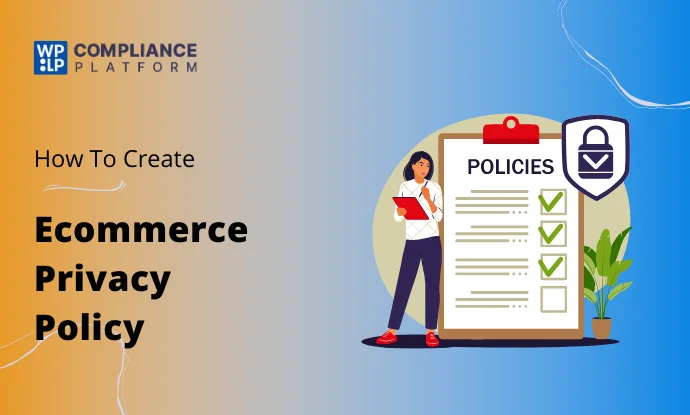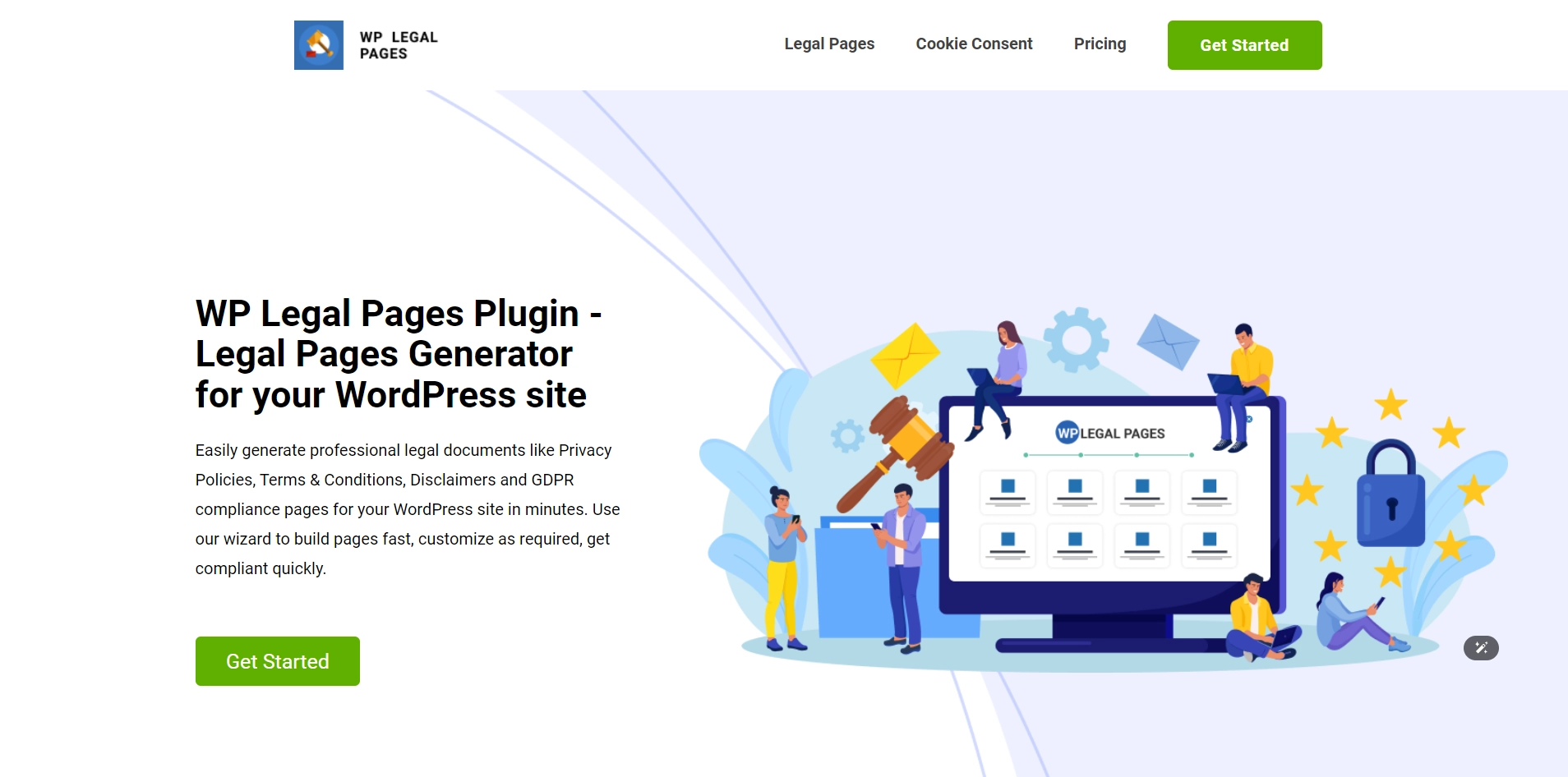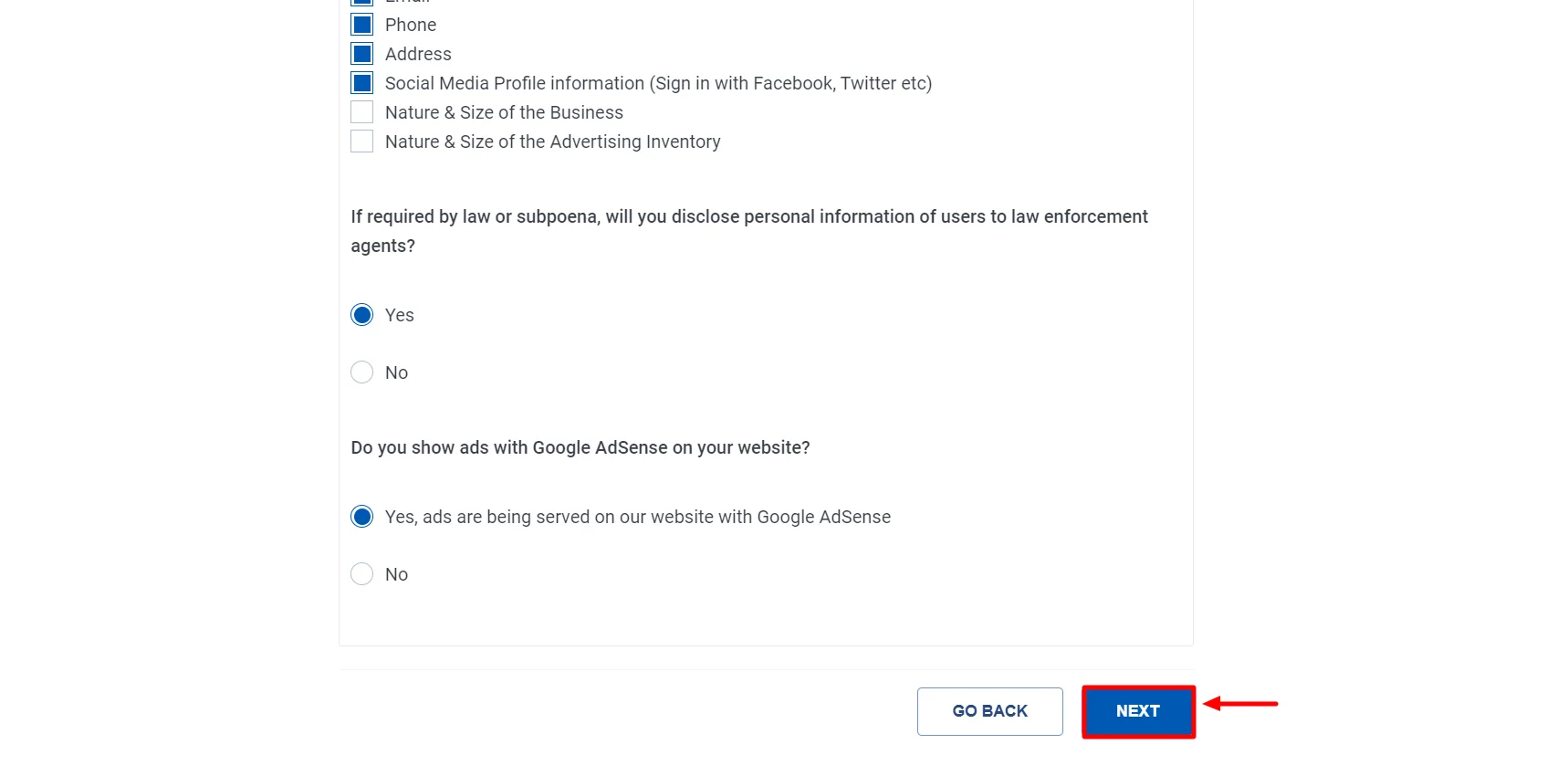eCommerce Privacy Policy: How To Create One for Your Online Store?

Summary
This article covers major privacy laws, the importance of user trust, and what information a privacy policy should include. We’ll also go through data handling, third-party services, and modern practices like AI personalisation and payment processing.
Do you want to create an eCommerce privacy policy for your online store?
If you own an eCommerce store or are thinking of starting one, you are probably trying to put together thousands of things. However, establishing customer credibility and legal compliance is the most important aspect of setting up an eCommerce privacy policy.
An eCommerce privacy policy explains what users can expect from the store when they choose to interact with it or buy something from your store.
As you continue reading, we’ll introduce you to a valuable tool that simplifies the process, making it effortless for you to generate a comprehensive privacy policy for your online platform.
- What is Privacy Policy for ecommerce Website?
- Major Privacy Laws Affecting Ecommerce Stores
- Why Do You Need an eCommerce Privacy Policy?
- What Should an Online Store Privacy Policy Include?
- How We Use AI for Personalised Shopping Experiences
- Best eCommerce Privacy Policy Generator
- How to Add eCommerce Privacy Policy To Your Store Website
- Step 4: Making a Privacy Policy for eCommerce Website
- Additional Legal Policy Pages for eCommerce Stores
- Conclusion:
What is Privacy Policy for ecommerce Website?
A privacy policy is one such legal document that defines different ways through which the website collects, processes, stores, shares, and protects the data of its users. Also, it even discloses the purpose behind this activity and the rights that users have in this regard.
In one way or the other. All websites are interacting with users and collecting their data. Typically, eCommerce websites collect personal data, like email addresses, names, IP addresses, session activity, payment details, and much more.
Keeping this in mind, an eCommerce privacy policy & terms and conditions are extremely important as they safeguard the owner of the website and the customers alike while ensuring that the website is adhering to legal responsibilities.
Major Privacy Laws Affecting Ecommerce Stores
When it comes to designing a privacy policy for an eCommerce website, the rules and regulations differ as per the country’s laws. For those based in the US, there is no specific data protection or privacy law for eCommerce websites or stores. However, there are few Important laws that can significantly impact your online eCommerce store:
California Online Privacy Protection Act (CCPA)
California Online Privacy Protection Act of 2003 necessitates that the operators of commercial websites should display a privacy policy on the sites. Under this legal agreement, one must add a privacy policy on the website.
The law further states that if you follow the practices mentioned below, then your websites should have a privacy policy.
- The kind of data collected by the website
- The sharing and disclosing of data
- Process for customers to review and edit the information that the website has
- The effective date of the policy and any changes made since then
EU Data Protection Directive
Having a privacy policy is crucial to complying with state laws. Privacy laws are more comprehensive in the UK and Europe.
Therefore, if your customers are from the UK or Europe, it is imperative to ensure that you adhere to the privacy laws.
EU Data Protection Directive of 1995 outlines the guidelines to which native laws, such as those in the UK, apply.
Business owners must cover the following points as per both legislations:
- Data collection will trigger notifications to the customers.
- Personal data obtained for certain and lawful reasons.
- Collecting data should be up-to-date and accurate.
- Personal data isn’t stored for longer than the necessary time period.
- Cautious security measures to protect the data
- No transfer of personal data to a country or territory outside the European Economic Area unless the appropriate level of protection is maintained
Personal Information Protection and Electronic Documents Act
The Canadian privacy policy laws are similar to US law, including the Personal Information Protection and Electronic Documents Act 2000. This act requires business owners to:
- Data collection, usage, or disclosure will require consent.
- Supply products or services to the customers even if the consent is denied.
- Gather information through lawful and fair means.
- Display understandable, readily available, and clear information policies.
Why Do You Need an eCommerce Privacy Policy?
At this point, it’s pretty clear that a privacy policy is fundamental. So, if your eCommerce website is intended to collect visitors’ data. It’s mandatory for you to display a privacy policy.
Having said that, here are some reasons that will tell you more about the importance of privacy policy for eCommerce websites.
1. Global Laws
It is crucial for every website to comply with numerous federal and state privacy laws, even if you have just added a contact form. These laws cover a variety of aspects related to privacy protection, and it is important to ensure that your website is following them.
2. Saves Money
In 2012, the California Attorney General’s Office specially applied CalOPPA for tablets and smartphones mobile applications, for collecting personal information. Authorities found several app providers violating the laws and gave them 30 days to either comply with the rules or submit a fine of up to $2500 for every download of their app.
3. Establishes Credibility & Trust
With an increase in corporate data breaches and identity thefts, online users are more cautious and interested in safeguarding their personal information. Hence, savvy customers demand that you protect their data.
With this, you establish trust and credibility among users, and they commit more to you without any regrets.
4. Third Parties Require It
Suppose you’ve integrated third-party companies into your eCommerce stores, such as Google and Amazon. In that case, you must display a privacy policy so as to use, distribute, advertise, and more through their websites. You will find several treaties, international laws, and pacts that govern data transfers and privacy policies between different countries.
As a consequence of not adhering to this law, you risk the chances of getting sued. Over a period of time SnapChat, Google, Delta Airlines, and many other huge companies had to bear the brunt of not displaying clear privacy policies.
What Should an Online Store Privacy Policy Include?
As you know, an eCommerce privacy policy consists of the major laws affecting it and the need for it. Also, you now exactly know what details are included in the eCommerce privacy policy.
The information you include in your ecommerce store’s Privacy Policy should be comprehensive yet written clearly so that the site visitors can easily understand your policies and their rights.
Here are a few things that you must include in an eCommerce privacy policy:
- The policy must clearly state the information your eCommerce website collects from users directly and indirectly from users.
- The policy must clearly state how the collected information is used.
- The policy must mention the types of information that may be collected in the future.
- The policy must specify how the company stores and secures customer data.
- You must include the rights and controls available to the user to access, correct, and delete their information.
- The user must be informed about the purpose of their use of cookies.
- It must disclose any third-party services or plugins integrated into your eCommerce platform.
Payment Gateway and Fraud Prevention Data Use
When a customer makes a payment on an online store, some information needs to be shared with payment partners. This includes details like payment amount and transaction status.
For UPI payments, data is processed securely through banking networks. Some platforms also use tools like Stripe Radar to detect suspicious activity. These tools use signals to reduce fraud and keep transactions safe.
The store does not see or store full card or bank details. Only required information is shared to complete the payment and prevent misuse. This protects both the customer and the business while keeping the checkout process smooth and secure.
Shipping Partners and Sharing Customer Information
To deliver orders, ecommerce stores need to share some customer details with shipping partners. This usually includes name, delivery address, and phone number. This information is shared only to complete the delivery and provide updates.
Shipping partners are required to handle this data securely and use it only for delivery purposes. They are not allowed to use the data for marketing or other activities.
Once the delivery is complete, the information is handled according to data protection rules. This ensures orders reach customers while keeping personal data safe.
How We Use AI for Personalised Shopping Experiences
This section explains how customer data is shared with shipping partners to deliver orders safely and on time.
- AI is used to understand general browsing patterns such as pages viewed, products searched, and time spent on the website to improve user experience.
- The data used for personalisation does not directly identify a customer and does not include sensitive information like payment details or contact information.
- AI helps recommend products, highlight relevant offers, and improve site navigation based on user activity.
- These systems work on grouped data patterns rather than tracking individual users personally.
- AI is not used to make decisions that affect pricing, payments, or user rights in any legal or financial way.
- Personalisation is meant only to improve shopping convenience and relevance for visitors.
- Customers remain in control of their data and can manage preferences where applicable.
Best eCommerce Privacy Policy Generator

In today’s world, creating legal pages for your website can be costly and time-consuming. But we’ve found a plugin that creates legal pages within seconds, saving you time and money.
If you are not aware of the legal terminologies and templates, there is a way to easily create an eCommerce privacy policy using a WordPress eCommerce privacy policy generator plugin- called WP Legal Pages. This easy-to-use plugin helps you take your pick from over 25+ customizable legal templates that you can use on your website.
Right from the eCommerce disclaimer template, return and refund policies, and standard eCommerce privacy policies, this plugin offers you a plethora of options to choose from. The best part is that many of the benefits of this plugin are available with the free version.
How to Add eCommerce Privacy Policy To Your Store Website
This section will discuss how to install the WP Legal Pages plugin.
Step 1: Installing and Activating the WP Legal Pages plugin.
To install the plugin, go to your WordPress dashboard, hover over the Plugins tab, and click on Add New.

Type WPLegalPages in the search bar.

Click the Install Now button.

Once you have installed it, activate it by clicking the Activate button.

Step 2: Configuring WP Legal Pages Plugin
Once you have activated the plugin, you can access it directly from the Dashboard.

Next, accept the terms of use of the WPLegalPages plugin.

Step 3: Create an Account with WP Legal Pages Plugin
Click on WP Legal Pages, then Create Legal Pages, and generate your legal pages.

This will open the WPLegalPages wizard. From the WPLegalPages wizard, choose the template and click the Create button.

Once you click Create, a popup will appear, asking you to create a new account. Click on New? Create a free account, or if you are an existing user, you can click on Connect your existing account.

Once you Sign up, your account will automatically connect to your site, and you can start creating legal pages for your website.

That’s it. You have created an account and can now start creating your website’s Legal Pages. Let’s see how we can create a Stand Privacy Policy for your eCommerce website.
Step 4: Making a Privacy Policy for eCommerce Website
You will now see Four Templates available in the free version. Click on the Standard Privacy Policy option to create a Privacy policy for your website.

Fill in the Basic Details and click Next.

Select the appropriate section for your legal policy, then click Next.

That’s it! Your eCommerce Privacy Policy Template Preview is ready.
Click the Create and Edit option to edit or add additional information to your privacy policy.

After you have made the necessary changes, click on Publish.

Using this free Privacy Policy Generator, you can comply with the legal requirements and also build the trust of your website visitors.
Additional Legal Policy Pages for eCommerce Stores

Following are the major legal documents that every eCommerce website needs to have for their protection and better user experience:
1. Privacy Policy
A privacy policy is a legal agreement between two parties. It discloses the ways in which one party can access the other party’s data. It is a document that carries a set of terms and conditions that you will follow while using the personal data of your users.
In the context of a website, it discloses how the operators of the website will collect, store, and utilize the personal data of its visitors. Nowadays, privacy policy is mandatory for any website. What policy to be followed depends on the area of operation.
For example, if a website deals with the people of California, it has to comply with CCPA. Similarly, if you deal with EU citizens, you have to follow GDPR. So, having a standard eCommerce privacy policy is very important for compliance across geographies.
2. Terms & Conditions
Terms and conditions, as the name suggests, are a set of rules that you will follow for different purposes. They dictate what is allowed on your website and what is not. You need to define everything clearly in detail. Clarity is of utmost importance, and there should not be any room for confusion or uncertainty.
Generally, the terms and conditions of a website contain rules about posting content, commenting, participating in a discussion or forum, etc. In the case of an eCommerce site, it acts as a legal contract between you and your users.
Using a terms and conditions generator plugin is a good idea if you are not familiar with legal policies and terminologies.
3. Return and Refund Policy
A return policy mostly defines the terms and conditions for returning a product, specifying, for example, the number of days or the condition under which an item can be returned. A refund policy dictates the terms and conditions of any refunds that the seller offers to the buyers after they return any product.
It talks in detail about the terms and conditions of return and refund. Generally, a refund policy contains the following information –
- How many days does a customer have to return a product?
- How will he get the refund, whether credit or replacement?
- Whether you offer refunds for digital products or any in-app purchase
- Who will pay for the shipping to return the product?
Here is an article elaborating on WooCommerce returns and refund policies
Conclusion:
As clear as it can get, the value of an eCommerce privacy policy cannot be denied or ignored at any cost. So, even before you think that your eCommerce portal is ready to go live and make transactions, ensure that the privacy policy is in its place and has clear and understandable information.
Having a privacy policy on your website not only complies with legal requirements but also lowers risk, builds trust, and boosts search engine optimization.
Our recommendation is to use WP Legal Pages to simplify your website and adhere to legal standards, as this will make creating the policy for your website less complicated.
Take quick action to protect both your website’s users and your own privacy by drafting a thoughtful privacy policy.
I hope you enjoyed reading this article. Don’t forget to check our other engaging articles.
- The Ultimate Guide To Creating Medical Disclaimer Effortlessly
- Adding Impressum Page to Your Website Using WP Legal Pages
- What’s the ePrivacy Directive? Everything You Need to Know!
Are you excited to create legal pages for your website and gain the trust of your visitors? Grab WP Legal Pages.
